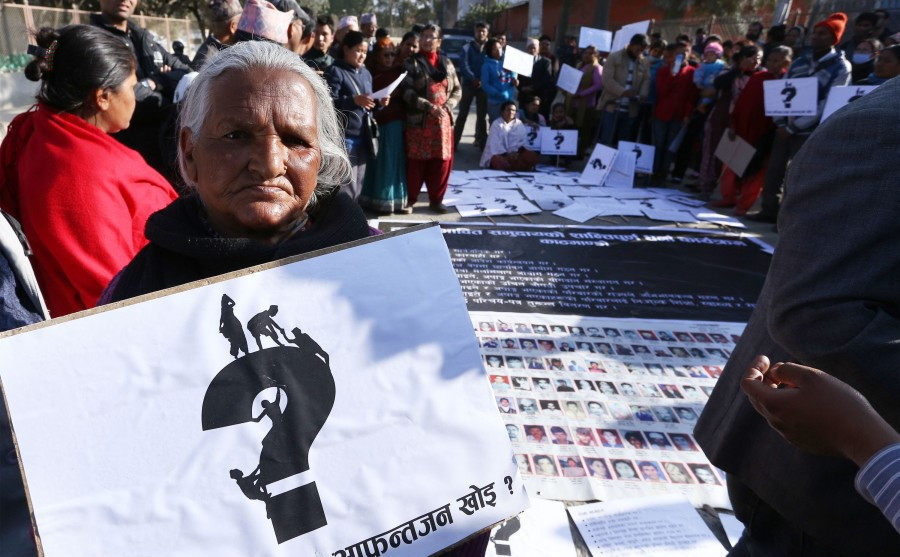Columns
Such a long wait for justice
The new Parliament must take concrete steps to conclude the transitional justice process.
Suman Adhikari
Twenty-one frustrating years have passed since the family of Muktinath Adhikari, murdered by the Maoists, began to seek justice. And yet, there is no sign that justice will be served anytime soon. Adhikari, a teacher at the Panini Sanskrit High School in Lamjung, was dragged out of the classroom, taken to a hill nearby, and shot dead on January 16, 2002. The state has failed to show any sincerity and sensitivity for an effective investigation into the murder. The District Police Office, the National Human Rights Commission (NHRC) and the Truth and Reconciliation Commission (TRC) have failed to act on the family's requests for investigation.
In the past 16 years after the Comprehensive Peace Agreement (CPA) was signed, conflicting parties have reconciled and enjoyed state power. Meanwhile, thousands of civilian victims are struggling for justice. Victims continue to suffer as their economic, social and cultural rights have been violated all these years. Victims are dying for want of treatment, medicine and care. Some are suffering from mental trauma, but the government remains indifferent.
Cosmetic process
The government and political parties have not made sincere efforts to keep the commitment of CPA—to investigate grave human rights violations and provide justice. As they shared state power, the parties to conflict designed a cosmetic process to delay, dilute and deny justice. They formed the transitional justice law, Truth and Reconciliation Commission (TRC), and the Commission of Investigation on Enforced Disappeared Persons (CIEDP) in 2015, under a political shadow. They lacked a vision for truth-seeking, reparation and institutional reforms. They only registered around 65,000 complaints but could deliver no solid result related to truth, justice and reparation.
Moreover, the victims' pain and injustice have been used for political benefit. Political parties have differing viewpoints according to their relationship with the Maoists. The government tried to issue an ordinance to release Resham Chaudhary from jail. The then Prime Minister KP Oli did not even meet the victims fearing Pushpa Kamal Dahal would be angry. Only after he was ousted from power did Oli speak in favour of the victims. But oral commitments have yielded nothing; they have just been repeated over decades.
Victims and stakeholders demand an amendment to the faulty provisions of the law following the Supreme Court rulings in 2015. The past Parliament did not discuss victims' pain and justice, not even once in five years. Political influence and internal conflicts among civil society and conflict victims have also weakened the process.
The appointment of Govinda Bandi as the Minister of Law, Justice and Parliamentary Affairs last year aroused hope and suspicion among the victims and stakeholders. The victims demanded a solid and credible transitional justice work plan with a timeline. An informal team led consultations in seven provinces and the capital city. The talks provided critical feedback for the overall transitional justice process. The consultations demanded a transparent and credible process, amendment of a law complying with Supreme Court rulings, addressing short-term to long-term needs of victims, no amnesty in serious violations, voluntary consent of victims in reconciliation in human rights violations, ensuring reparation rights and development of comprehensive reparation policy.
The consultation also provided inputs special court decisions, victim-centric and gender-sensitive procedures, vetting, property transfer of the disappeared, recognition of sexual violence victims, independent and credible commission with different units, credible truth-seeking process, protection of victims and witnesses, psychological counselling, and credible identify card, among others.
The government secretly drafted the amendment bill and tabled it in Parliament without any consultation with stakeholders. The bill included some sensible provisions such as reparation as a right, relief to the victim after a preliminary investigation, the right to property of the disappeared family, and a special court, among others. But it also had several objectionable provisions. It divided violations into two categories: Serious offences that cannot be granted amnesty, heavily narrowing down its scope, and human rights violations that can be granted amnesty and reconciliation.
Cruel murder or murder after torture, rape, enforced disappearances and inhuman or cruel torture committed against unarmed or ordinary people were mentioned under severe rights violations. Murder was included under human rights violation qualifying for amnesty and reconciliation. It lacked the provision for appealing Special Court decisions. It also had the provision of reduced sentencing under the Penal Code provisions that have no retroactive effect. The Attorney General is provided six months to decide to prosecute. There will be no prosecution if there is no decision within the timeline. A prosecution based on weak evidence of human rights violations from TRC and CIEDP but no criminal investigation seems to lead to pseudo-prosecution.
During the amendment process, top leaders such as Sher Bahadur Deuba, KP Sharma Oli, Pushpa Kamal Dahal and Madhav Kumar Nepal committed to prioritising the voices of the victims. Contrary to the commitment, the amendment bill was entangled in the Parliamentary Committee due to the differing positions of major political parties. The CPN-UML said every murder should be included under severe violations that cannot be granted amnesty. We are waiting to see if the CPN-UML still takes the same position or ignores it since it has now become a coalition partner with the Maoists.
Responsibility of Parliament
Conflict victims continue to wait for the state agencies to become sensitive and accountable and deliver much-delayed justice. The government has to develop the amendment bill immediately based on consultations, Supreme Court rulings and international practice. The new Parliament is responsible for easing the victims' pain and taking a reasonable, concrete step to conclude the transitional justice process. Parliament should take the initiative to approve a bill acceptable to all stakeholders and adopt a credible process. Competent persons having a clear vision and plan of action to ensure justice and a successful conclusion of transitional justice should be selected and appointed to the commissions through a transparent and credible process.




 17.12°C Kathmandu
17.12°C Kathmandu















